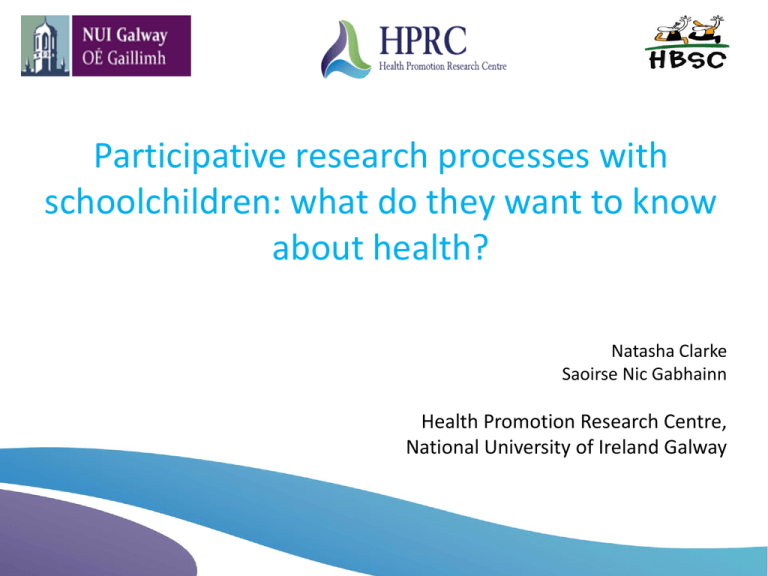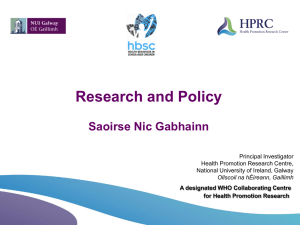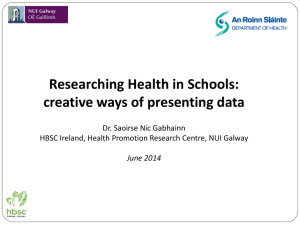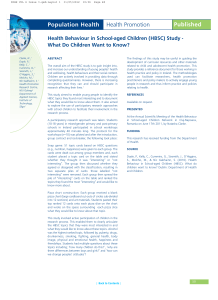Participative research processes with schoolchildren: what do they want to know
advertisement

Participative research processes with schoolchildren: what do they want to know about health? Natasha Clarke Saoirse Nic Gabhainn Health Promotion Research Centre, National University of Ireland Galway Health Behaviour in School-aged Children (HBSC) • Cross-national study in collaboration with WHO Europe • 4 year cycle, in 2010 43 countries and regions • 16,060 Irish young people participated in 2010 HBSC aim: Gain insight into and increase our understanding of young people’s health and well-being, health behaviours and their social context. Background • HBSC Ireland liaises with various stakeholders through out the research process • Until recently children’s involvement in the research process has been minimal • This project is one step in a planned series of steps designed to increase children’s participation with HBSC Ireland. Why involve children? • Potential health promoting benefits to youth • Inform the research at various stages question development, testing, design and dissemination • Insure the research relevant to young people’s lives • Make the materials for schools more youth friendly. Aims of this study • To investigate what HBSC topics Irish children find most interesting • To document what they would like to know about each ‘interesting’ topic. Participation • Engagement of research participants in the research process • Transfer of power and control to the participants • Process of research can be health promoting. • Adoption of the Convention on the Rights of the Child in 1989 – article 12: states that children and young people should have their opinions taken into account in all major decisions affecting their lives. Research Questions 1. Can we use participatory research approaches with schoolchildren to facilitate their involvement in the research and planning process? 2. What would young people in Ireland like to know about health and related topics? Methodology • School-children – mixed gender, aged 10-18 years • Nine schools; 5 primary and 4 post-primary • Rural, urban, disadvantaged and non-disadvantaged • Consent obtained from schools, parents and children • Ten workshops with 19 groups of children (40 minutes). Workshop Procedure Introduction: Outline of HBSC research process Icebreaker: Group game Group Contract: Group-set principles for the workshops Snap Game: 51 topic cards to rank in order of interest Pizza chart: one section for each of the 12 interesting topics. Workshop Pizza Chart Ranking Topic 1 2 3 4 5 6 7 8 9 10 11 12 Alcohol Puberty Drugs Being really drunk Smoking Fighting Your health Body image Physical health Emotional Health Happy with life Close friends No. of groups ranking topic in their list of top 12 most interesting 16 14 14 14 12 11 9 9 9 8 8 8 What children want to know about alcohol What children want to know about puberty What children want to know about drugs What children want to know about smoking Discussion • Students indicated a broad interest in HBSC topics and volunteered many specific questions that could be addressed through health education or health media • This process provided children with the opportunity to explore their own priorities in relation to the information gathered through HBSC • These data could be used to guide curricular resources & other materials in child and adolescent health promotion. Discussion • The results could serve as a catalyst for change in relation to health promotion practice with children and young people • The findings could help in future planning for HBSC surveys and dissemination activities • The methodologies used in this work can facilitate researchers, health promotion practitioners and policy makers to actively engage participants in research and thus inform practice and policies relating to health. Future work • To develop a web resource to answer/address some of the questions posed by young people in Ireland • To work more closely with young people on the HBSC Ireland research process • To further develop and refine the participatory research processes used here • To continue to the work on youth participation within HBSC international. Acknowledgements • Children, schools and parents • Ms. Priscilla Doyle • Ms. Natasha Clarke • Dr. Colette Kelly • Ms. Gail Cummins • Dr. Jane Sixsmith • Dr. Siobhan O’ Higgins • Dr. Michal Molcho saoirse.nicgabhainn@nuigalway.ie HBSC Ireland http://www.nuigalway.ie/hbsc/ HBSC International htpp://www.hbsc.org HPRC (Health Promotion Research Centre) http://www.nuigalway.ie/hprc


